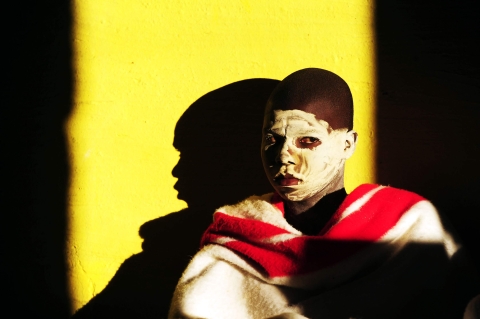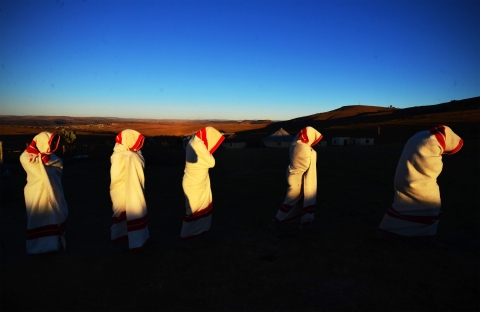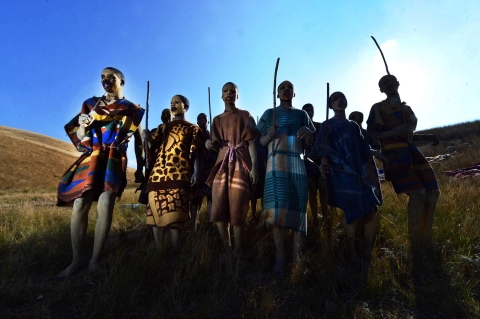
In South Africa’s Eastern Cape, where circumcision of teen boys is a rite of passage to adulthood, unlicensed surgeons too often cause injury and even death. To help reduce the number of botched circumcisions, a pioneering web app is helping connect young men and their families with practitioners who are trained and licensed.
Called Ezolwaluko in Xhosa, or Initiation Watch in English, the app was created by City Press in partnership with International Center for Journalists (ICFJ) partner Code for Africa and Open Data Durban. The tool gives families in the Eastern Cape region a way to check whether their traditional surgeon is registered, report surgeons who are illegally conducting male circumcisions and access medical help if an operation goes wrong. The app also connects unlicensed surgeons with government agencies that offer training.
"I’m amazed at the work that has been done by this app, because it answers a lot of problems we have that we are trying to deal with,” said Mfundo Ngele, deputy director of operations with the House of Traditional Leaders in the Eastern Cape, one of six provinces in South Africa with formal organizations of tribal leaders. “This app assists us because you might think that deaths are because of ignorance, but often it’s because people don’t know where to go. This app is just amazing.”
Male circumcision is part of coming-of-age rites held in June and July and again in November and December. The current season began in mid-November and is now underway in the Eastern Cape, where most circumcisions are performed. Dozens of young men and boys die every year during initiation ceremonies due to medical complications, dehydration and other factors. More than 800 initiates in South Africa underwent penile amputation in a recent 12-year period because of botched circumcisions, according to the Department of Cooperative Governance and Traditional Affairs (CoGTA).

City Press and Code for Africa launched Initiation Watch in 2016 to coincide with a new law allowing authorities to charge unlicensed surgeons with attempted murder or murder if injuries or deaths result from their work.
“The app provides solutions for families and for surgeons,” said ICFJ Knight Fellow Chris Roper, a veteran South African editor who has helped lead the initiative for Code for Africa. “Families can check for registered traditional surgeons, and traditional surgeons who aren’t licensed have a way to apply to the responsible department.”
During the first initiation season that the app was used, deaths in the Eastern Cape fell from 46 to 29 -- almost 40 percent, according to CoGTA. During the second season, they fell to 11, one of the lowest levels in the past decade. But authorities reported an uptick in deaths during the past two initiation seasons after the 2016 law turned over full responsibility for governing the ceremonies to traditional leaders.
When an initiation season approaches, user activity on the app spikes, said Nicki Gules, assistant editor of news and investigations at City Press.
“Interestingly, the app is being used by would-be initiates themselves,” Gules said. “This is understandable considering younger people would be more comfortable and able to use a technological solution to a traditional problem.”
The app is part of a broader effort to improve the safety of initiation ceremonies. City Press and its sister newspaper, The Daily Sun, have increased coverage of the ceremonies, as well as the cultural pressures that can prevent young men from seeking help if something goes wrong.
"The role of the media is appreciated,” said Ngele, with the House of Traditional Leaders. “They’re not only reporting about deaths now, but about the complexities.”

For the next phase of Initiation Watch, City Press and Code for Africa are hoping to fund reporters to create an updated list of registered traditional surgeons and nurses in Eastern Cape, data that plays an essential role in the utility of the app. The Eastern Cape Department of Health has not provided an updated list for several years, despite repeated entreaties to the department, said Gules, the City Press assistant editor.
“Our vision is to take the problem into our own hands, and call every single traditional leader in Eastern Cape and ask them for the contact details of the traditional surgeons they sanction, in terms of the new Act, in their areas,” Gules said.
The Initiation Watch project has received two awards from the Community Development Foundation of South Africa. City Press correspondent Lubabalo Ngcukana also won the Discovery Foundation’s Nation Builder Award for his reporting in conjunction with the project. Code for Africa is a data journalism initiative founded in 2012 by ICFJ Knight Fellow Justin Arenstein in collaboration with ICFJ.